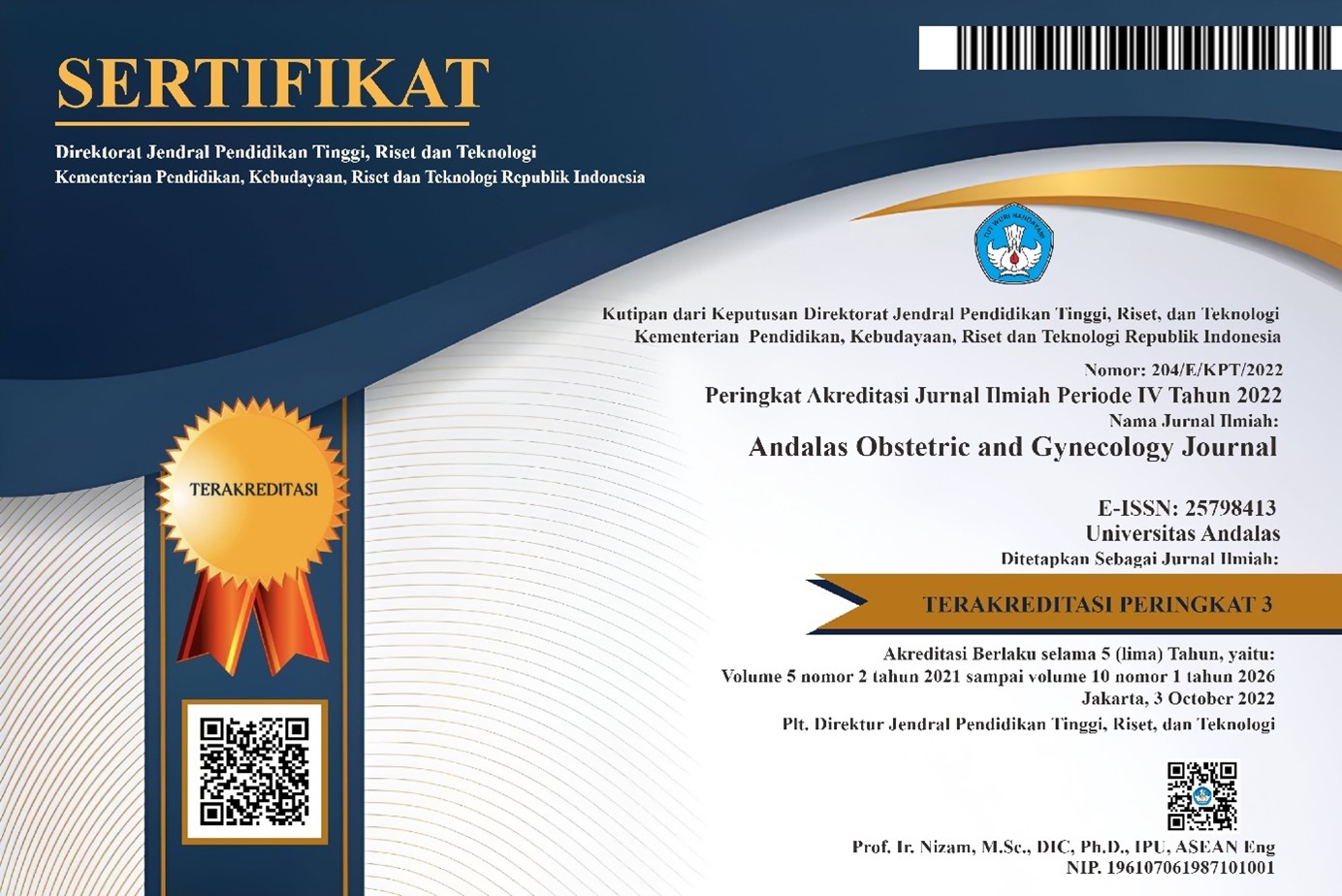Publication Ethics
PUBLICATION ETHICS OF AOJ
The publication of an article in the peer-reviewed Andalas Obstetrics and Gynecology Journal (AOJ) contributes to growth of knowledge. We encourage the best standards of publication ethics and take all possible measures against publication malpractices. It is important to agree upon standards of proper ethical behavior for all parties involved in the act of publishing: authors, editors, peer reviewers and the publisher.Andalas Obstetrics and Gynecology Journal (AOJ) is committed to upholding the highest standards of publication ethics.
1. Authorship and Contributorship
AOJ requires clear policies on authorship and contributorship, ensuring transparency around who contributed to the work and in what capacity. The journal manages potential authorship disputes promptly and fairly.
2. Complaints and Appeals
AOJ has a clearly described process for handling complaints against the journal, its staff, editorial board, or publisher. The journal treats all complaints seriously and endeavors to resolve them in a fair and impartial manner.
3. Allegations of Misconduct
AOJ has a well-defined process for handling allegations of misconduct, regardless of how they are brought to the journal's attention. The journal takes all allegations seriously and is committed to investigating and addressing them promptly and appropriately. This includes addressing allegations from whistleblowers.
4. Conflicts of Interest / Competing Interests
AOJ provides clear definitions of conflicts of interest and has established processes for handling conflicts of interest for authors, reviewers, editors, journals, and publishers. The journal ensures that any conflicts of interest are disclosed and managed appropriately.
5. Data and Reproducibility
AOJ includes policies on data availability and encourages the use of reporting guidelines and the registration of clinical trials and other study designs as per standard practice in their respective disciplines. The journal promotes transparency and reproducibility of research.
6. Ethical Oversight
AOJ maintains ethical oversight by implementing policies on consent to publication, publication on vulnerable populations, ethical conduct of research using animals, ethical conduct of research using human subjects, handling confidential data, and ethical business/marketing practices.
7. Intellectual Property
AOJ has clear policies on intellectual property, copyright, and publishing licenses, which are described to authors. The journal ensures that authors are aware of the policies on prepublication and what constitutes plagiarism and redundant/overlapping publication.
8. Post-Publication Discussions and Corrections
AOJ allows post-publication discussions through letters to the editor, on-site debates, or external moderated platforms. The journal has mechanisms in place for correcting, revising, or retracting articles after publication, as necessary.
9. Archiving Policy
AOJ maintains an archiving policy to preserve the published articles in reputable digital archives, ensuring long-term accessibility and availability. The journal may collaborate with services like PKP PN Archiving Service and Portico for archiving purposes.
10. Open Access Policy
AOJ follows an open access policy, allowing free and unrestricted access to its published articles. The journal applies the Creative Commons Attribution 4.0 International License to ensure authors' sharing and adaptation of the content.
11. Review Process
AOJ implements a double-blind peer-review process, where the identities of authors and reviewers are kept anonymous. The journal assigns a minimum of two reviewers, with the option to assign more if needed, to ensure thorough and unbiased evaluations of manuscripts.
Editor's Responsibilities
- The editorial board is responsible for publishing AOJ within the designated period.
- The editorial board is fully responsible for accepting and rejecting scientific articles and for the journal's quality and integrity.
- Editors must publish erratum pages or make corrections if necessary.
- Editors do not allow conflicts of interest among authors, reviewers, and editors.
- Editors will not change decisions regarding accepting and rejecting scientific works except for justified reasons.
Reviewer's Responsibilities
- Reviewers must keep and maintain all confidential information about research data.
- Reviewers treat written works objectively and provide clear and relevant arguments.
- Reviewers do not review manuscripts with conflict of interest due to competitive, collaborative, or other relationships such as connections with any author or editorial board member.
Author's Responsibilities
- Authors agree that the scientific work submitted is original, has not been published in any other journal, or is currently under consideration by another publisher.
- All authors participated in the research process and/or the creation of scientific work and agreed to its publication.
- Authors must use relevant references in their scientific writing.
- Authors must pay publication fees as stipulated.
Rules in Publishing
- All editorial board members, reviewers, and authors must confirm and comply with the established rules.
- Authors can only make significant changes to the article after acceptance of severe reasons.
- All editorial board members and authors must be willing to publish all corrections honestly and sincerely.
- Notes on plagiarism, fraudulent data, or other types of fraud must be fully reported.







